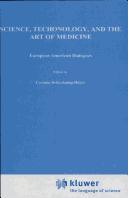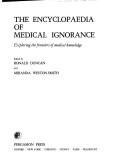| Listing 1 - 10 of 246 | << page >> |
Sort by
|
Book
ISBN: 9780415501095 9781315159843 9781351660754 9781351660730 9780415501071 0415501091 Year: 2018 Publisher: London Routledge
Abstract | Keywords | Export | Availability | Bookmark
 Loading...
Loading...Choose an application
- Reference Manager
- EndNote
- RefWorks (Direct export to RefWorks)

ISBN: 0792318692 904814177X 9401729603 Year: 1993 Volume: vol 44 Publisher: Dordrecht Boston London Kluwer Academic
Abstract | Keywords | Export | Availability | Bookmark
 Loading...
Loading...Choose an application
- Reference Manager
- EndNote
- RefWorks (Direct export to RefWorks)
Medicine --- Philosophy. --- Philosophy --- Medicine - Philosophy.

ISBN: 0080245153 0080245145 9780080245157 Year: 1984 Publisher: Oxford ; New York : Pergamon Press,
Abstract | Keywords | Export | Availability | Bookmark
 Loading...
Loading...Choose an application
- Reference Manager
- EndNote
- RefWorks (Direct export to RefWorks)
Medicine --- Philosophy --- Philosophy. --- Trends. --- trends. --- Medicine - Philosophy
Book
ISBN: 2234009758 9782234009752 Year: 1979 Publisher: Paris: Pernoud / Stock,
Abstract | Keywords | Export | Availability | Bookmark
 Loading...
Loading...Choose an application
- Reference Manager
- EndNote
- RefWorks (Direct export to RefWorks)
Philosophy, Medical --- Medicine --- Science --- Philosophy --- Medicine - Philosophy --- Science - Philosophy
Book
ISBN: 9788884507624 8884507626 Year: 2017 Volume: 79 Publisher: Firenze: SISMEL,
Abstract | Keywords | Export | Availability | Bookmark
 Loading...
Loading...Choose an application
- Reference Manager
- EndNote
- RefWorks (Direct export to RefWorks)
Medicine --- Philosophy, Medieval --- Philosophy, Modern --- Philosophy --- History --- Medicine - Philosophy - History
Book
ISBN: 9783772826450 3772826458 Year: 2019 Volume: 15 Publisher: Stuttgart: Frommann-Holzboog,
Abstract | Keywords | Export | Availability | Bookmark
 Loading...
Loading...Choose an application
- Reference Manager
- EndNote
- RefWorks (Direct export to RefWorks)
This volume contains all of Schelling’s contributions to the "Jahrbüchern der Medicin" (Yearbooks of Medicine) (1805–1808), which he established along with the physician Adalbert Friedrich Markus. In this journal, which in many ways could be seen as the continuation of the "Zeitschrift für spekulative Physik" (Journal for Speculative Physics) Schelling resolved to apply natural philsophy to the field of medicine. His goal was to initiate a scholarly treatment of medicine, based on natural philosophy, and to protect this from the competing theory of Brownianism.
Philosophy of nature --- Philosophy, German --- Medicine --- Philosophy --- Medicine - Philosophy
Book
ISBN: 9780300161144 030016114X Year: 2016 Publisher: New Haven Yale University Press
Abstract | Keywords | Export | Availability | Bookmark
 Loading...
Loading...Choose an application
- Reference Manager
- EndNote
- RefWorks (Direct export to RefWorks)
The correspondence between the eighteenth-century mathematician and philosopher G. W. Leibniz and G. E. Stahl, a chemist and physician at the court of King Friedrich Wilhelm I of Prussia, known as the Leibniz-Stahl Controversy, is one of the most important intellectual contributions on theoretical issues concerning pre-biological thinking. Editors François Duchesneau and Justin E. H. Smith offer readers the first fully annotated English translation of this fascinating exchange of philosophical views on divine action, the order of nature, causality and teleology, and the soul-body relationship.
Philosophy, German --- Medicine Philosophy --- Philosophical anthropology --- Philosophers --- Medicine --- Philosophy --- Leibniz, Gottfried Wilhelm, --- Stahl, Georg Ernst, --- Medicine - Philosophy --- Philosophers - Germany - Correspondence --- Medicine - Philosophy - Early works to 1800 --- Leibniz, Gottfried Wilhelm, - Freiherr von, - 1646-1716 --- Stahl, Georg Ernst, - 1660-1734
Book

ISBN: 3319946099 3319946102 Year: 2018 Publisher: Cham : Springer International Publishing : Imprint: Springer,
Abstract | Keywords | Export | Availability | Bookmark
 Loading...
Loading...Choose an application
- Reference Manager
- EndNote
- RefWorks (Direct export to RefWorks)
This book is open access under a CC BY license. This book is the first to develop explicit methods for evaluating evidence of mechanisms in the field of medicine. It explains why it can be important to make this evidence explicit, and describes how to take such evidence into account in the evidence appraisal process. In addition, it develops procedures for seeking evidence of mechanisms, for evaluating evidence of mechanisms, and for combining this evaluation with evidence of association in order to yield an overall assessment of effectiveness. Evidence-based medicine seeks to achieve improved health outcomes by making evidence explicit and by developing explicit methods for evaluating it. To date, evidence-based medicine has largely focused on evidence of association produced by clinical studies. As such, it has tended to overlook evidence of pathophysiological mechanisms and evidence of the mechanisms of action of interventions. The book offers a useful guide for all those whose work involves evaluating evidence in the health sciences, including those who need to determine the effectiveness of health interventions and those who need to ascertain the effects of environmental exposures.
Philosophy. --- Epistemology. --- Medicine --- Philosophy of Medicine. --- Medical logic --- Epistemology --- Theory of knowledge --- Philosophy --- Psychology --- Mental philosophy --- Humanities --- Medicine-Philosophy. --- Genetic epistemology. --- Developmental psychology --- Knowledge, Theory of --- Health Workforce --- Medicine—Philosophy. --- Medicine—Philosophy --- Knowledge, Theory of.
Book
ISBN: 3319320181 3319320203 Year: 2016 Publisher: Cham : Springer International Publishing : Imprint: Springer,
Abstract | Keywords | Export | Availability | Bookmark
 Loading...
Loading...Choose an application
- Reference Manager
- EndNote
- RefWorks (Direct export to RefWorks)
This book is a critical survey of and guidebook to the literature on biological functions. It ties in with current debates and developments, and at the same time, it looks back on the state of discourse in naturalized teleology prior to the 1970s. It also presents three significant new proposals. First, it describes the generalized selected effects theory, which is one version of the selected effects theory, maintaining that the function of a trait consists in the activity that led to its differential persistence or reproduction in a population, and not merely its differential reproduction. Secondly, it advances “within-discipline pluralism” (as opposed to between-discipline pluralism) a new form of function pluralism, which emphasizes the coexistence of function concepts within diverse biological sub-disciplines. Lastly, it provides a critical assessment of recent alternatives to the selected effects theory of function, namely, the weak etiological theory and the systems-theoretic theory. The book argues that, to the extent that functions purport to offer causal explanations for the existence of a trait, there are no viable alternatives to the selected effects view. The debate about biological functions is still as relevant and important to biology and philosophy as it ever was. Recent controversies surrounding the ENCODE Project Consortium in genetics, the nature of psychiatric classification, and the value of ecological restoration, all point to the continuing relevance to biology of philosophical discussion about the nature of functions. In philosophy, ongoing debates about the nature of biological information, intentionality, health and disease, mechanism, and even biological trait classification, are closely related to debates about biological functions.
Philosophy. --- Biology --- Medicine --- Philosophy of Biology. --- Philosophy of Medicine. --- Science --- Normal science --- Philosophy of science --- Vitalism --- Biology-Philosophy. --- Medicine-Philosophy. --- Biology—Philosophy. --- Medicine—Philosophy.
Book
ISSN: 11516461 ISBN: 2908602601 9782908602609 Year: 1995 Publisher: Le Plessis-Robinson : Synthelabo,
Abstract | Keywords | Export | Availability | Bookmark
 Loading...
Loading...Choose an application
- Reference Manager
- EndNote
- RefWorks (Direct export to RefWorks)
Quacks and quackery --- Medicine --- Philosophy --- Anthropologie --- Médecine --- thérapie familiale --- Medicine - Philosophy
| Listing 1 - 10 of 246 | << page >> |
Sort by
|

 Search
Search Feedback
Feedback About UniCat
About UniCat  Help
Help News
News